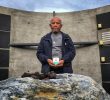By Grace S. Uddin
davaotoday.com
DAVAO CITY — The ground would shake, like when there�s an earthquake, each time the bombs fell. Miko Corido, a thirty-something Davaoeno who worked as a domestic helper in Lebanon, was traumatized and bruised, literally, by the experienced.
Delia Torocio, 24 and also a maid in Lebanon, described the bombings the same way. �I could not sleep for fear that I might die anytime,� she said in a forum organized last week by the Center for Overseas Workers, a nonprofit group based in this city. When Delia�s boss fled to Egypt, she was left in the care of her employer�s mother.
Although Rose Salibat did not suffer the same fate in Lebanon, her work as a domestic helper in Kuwait was just as hellish. �I was ironing clothes when my boss stood behind me, naked. He tried to embrace me,� Rose said. Luckily, she was able to flee.
Rose and many other Filipinas in Kuwait only rest for three hours every day. Sleeping and the visits to the bathroom were precious moments for them. The food ate, meanwhile, were leftovers. They took their baths with shampoo or soap; they didn�t event have toothpaste. �We were really maltreated because they see us as slaves,� Rose said.
Miko, Delia and Rose are now back in their homeland. Their accounts were some of the few shared during the forum attended by several local chapters of OFW groups. The forum was meant to give an overview of the war in Lebanon, the state of the OFWs in the Middle East, the actions taken by the national government, and what more additional assistance or support local citizens and groups can share.
The war against Lebanon is merely a way for the United States to conquer the Middle East, which is known for its rich oil reserves, according to Jessica Tullock, one of the speakers and the coordinator for InPeace, a Davao-based peace advocacy group.
�Controlling the Middle East gives one an assurance of long-term power and resources,� Tullock said.
She explained that Israel is supported by US power in the Middle East, having been the largest recipient of US foreign assistance for nearly 30 years, getting a share of 17 percent of all US foreign aid.
Furthermore, she added, 20 percent of Israel�s military budget comes from US support and, in 2005, Israel received $2.2 billion in US military aid.
The Middle East is one of the top destinations of Filipino overseas workers. Lebanon, for instance, hires mostly domestic helpers, dressmakers, service workers such as sales ladies — jobs that are mainly for women. In 2004, it has a population of 34,437 Filipino workers and, in 2005, some 14,936 Filipinos went there, according to the Philippine Overseas Employment Administration.
According to Sister Celine Cajanding, the executive director of Center for Overseas Workers, Filipinos are forced to leave the country due to lack of job opportunities, lack of government services, indebtedness and other economic issues such as poor business climate.
The waves of forced migration of Filipinos have been going on since 1900s. In the first wave, Guam and the US were the top migration destinations for Filipino workers, to work in the plantations. In 1950s, professionals, doctors, nurses and medical practitioners fled to Europe. Later, in the 1980s, skilled and semi-skilled workers went to Middle East, while entertainers and sex workers entered Japan in the 1990s.
OFWs have been keeping the country�s economy afloat. For every worker that goes abroad, he or she shells out 17,875 pesos to pay for signatures, passports, immigration fees, Medicare and other fees. This does not include filing fees, license fees and the likes, increasing the POEA�s collection from 276 million pesos in 2001 to 310 million pesos in 2004.
Remittances increased from 7.721 billion pesos in 2001 to 12.293 billion pesos in 2005, �according to the Bangko Sentral ng Pilipinas.
Such large amounts contributed by the overseas workers to the Philippine economy have made COW and the rest of the participants in the forum question why the government cannot seem to get its act together in making sure that the OFWs in the Middle East are safely transported to the country.
The war in Lebanon was the reason why OFWs like Miko and Delia were sent back home. However, according to Rose, �It is very hard for us to be back here because our family has high expectations. We came back empty- handed.� Rose still has plans of leaving the country again because she doesn�t think she can find a job here.
Some forum participants, specifically those from the Integrated Gender and Development Division of the City Hall, suggested that the OFWs go directly to the mayor�s office to seek help.
Councilor Pilar Braga, who was also present, assured them that the local ordinance for the establishment of an OFW Center here was already submitted to City Hall. It is now awaiting implementation.
Braga also said that the generation of jobs for returning OFWs will also be a priority of the city government, as well as enacting policies to strengthen the OWWA and POEA, the government offices that deal mainly with the welfare of OFWs. Councilors Angela Librado, Peter Lavina and Mabel Acosta also expressed their support for these initiatives.
OFWs like Rose are happy that with these initiatives but she hopes the national government would do more. �They say we are the unsung heroes,� she said. �Then the government should be prepared to help us.� (Grace S. Uddin/davaotoday.com)










